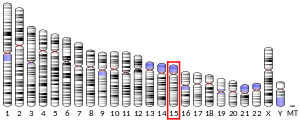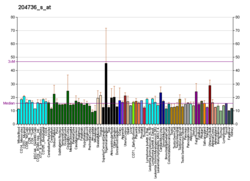Neuron-glial_antigen_2
CSPG4
Protein-coding gene in the species Homo sapiens
Chondroitin sulfate proteoglycan 4, also known as melanoma-associated chondroitin sulfate proteoglycan (MCSP) or neuron-glial antigen 2 (NG2), is a chondroitin sulfate proteoglycan that in humans is encoded by the CSPG4 gene.[5][6][7]
CSPG4 plays a role in stabilizing cell-substratum interactions during early events of melanoma cell spreading on endothelial basement membranes. It represents an integral membrane chondroitin sulfate proteoglycan expressed by human malignant melanoma cells.[7]
CSPG4/NG2 is also a hallmark protein of oligodendrocyte progenitor cells (OPCs)[8] and OPC dysfunction has been implicated as a candidate pathophysiological mechanism of familial schizophrenia.[9] A research group investigating the role of genetics in schizophrenia, reported, two rare missense mutations in CSPG4 gene, segregating within families (CSPG4A131T and CSPG4V901G mutations). The researchers also demonstrate that the induced pluripotent stem cells (iPSCs)-derived OPCs from CSPG4A131T mutation carriers exhibited abnormal post-translational processing, subcellular localization of the mutant NG2 protein, aberrant cellular morphology, and a decreased cell viability and myelination potential. In vivo diffusion tensor imaging of the brain of CSPG4A131T mutation carriers demonstrated a reduced white matter integrity compared to the unaffected sibling and matched general population controls.[10]
- "Human PubMed Reference:". National Center for Biotechnology Information, U.S. National Library of Medicine.
- "Mouse PubMed Reference:". National Center for Biotechnology Information, U.S. National Library of Medicine.
- Pluschke G, Vanek M, Evans A, Dittmar T, Schmid P, Itin P, Filardo EJ, Reisfeld RA (September 1996). "Molecular cloning of a human melanoma-associated chondroitin sulfate proteoglycan". Proceedings of the National Academy of Sciences of the United States of America. 93 (18): 9710–5. Bibcode:1996PNAS...93.9710P. doi:10.1073/pnas.93.18.9710. PMC 38494. PMID 8790396.
- Luo W, Wang X, Kageshita T, Wakasugi S, Karpf AR, Ferrone S (May 2006). "Regulation of high molecular weight-melanoma associated antigen (HMW-MAA) gene expression by promoter DNA methylation in human melanoma cells". Oncogene. 25 (20): 2873–84. doi:10.1038/sj.onc.1209319. PMID 16407841. S2CID 39073910.
- Nishiyama A, Dahlin KJ, Prince JT, Johnstone SR, Stallcup WB (July 1991). "The primary structure of NG2, a novel membrane-spanning proteoglycan". The Journal of Cell Biology. 114 (2): 359–71. doi:10.1083/jcb.114.2.359. PMC 2289079. PMID 1906475.
- de Vrij FM, Bouwkamp CG, Gunhanlar N, Shpak G, Lendemeijer B, Baghdadi M, Gopalakrishna S, Ghazvini M, Li TM, Quadri M, Olgiati S, Breedveld GJ, Coesmans M, Mientjes E, de Wit T, Verheijen FW, Beverloo HB, Cohen D, Kok RM, Bakker PR, Nijburg A, Spijker AT, Haffmans PM, Hoencamp E, Bergink V, Vorstman JA, Wu T, Olde Loohuis LM, Amin N, Langen CD, Hofman A, Hoogendijk WJ, van Duijn CM, Ikram MA, Vernooij MW, Tiemeier H, Uitterlinden AG, Elgersma Y, Distel B, Gribnau J, White T, Bonifati V, Kushner SA (January 2018). "Candidate CSPG4 mutations and induced pluripotent stem cell modeling implicate oligodendrocyte progenitor cell dysfunction in familial schizophrenia". Molecular Psychiatry. 24 (5): 757–771. doi:10.1038/s41380-017-0004-2. PMC 6755981. PMID 29302076.
- de Vrij FM, Bouwkamp CG, Gunhanlar N, Shpak G, Lendemeijer B, Baghdadi M, Gopalakrishna S, Ghazvini M, Li TM, Quadri M, Olgiati S, Breedveld GJ, Coesmans M, Mientjes E, de Wit T, Verheijen FW, Beverloo HB, Cohen D, Kok RM, Bakker PR, Nijburg A, Spijker AT, Haffmans PM, Hoencamp E, Bergink V, Vorstman JA, Wu T, Olde Loohuis LM, Amin N, Langen CD, Hofman A, Hoogendijk WJ, van Duijn CM, Ikram MA, Vernooij MW, Tiemeier H, Uitterlinden AG, Elgersma Y, Distel B, Gribnau J, White T, Bonifati V, Kushner SA (January 2018). "Candidate CSPG4 mutations and induced pluripotent stem cell modeling implicate oligodendrocyte progenitor cell dysfunction in familial schizophrenia". Molecular Psychiatry. 24 (5): 757–771. doi:10.1038/s41380-017-0004-2. PMC 6755981. PMID 29302076.
- Kirschfink M, Blase L, Engelmann S, Schwartz-Albiez R (February 1997). "Secreted chondroitin sulfate proteoglycan of human B cell lines binds to the complement protein C1q and inhibits complex formation of C1". Journal of Immunology. 158 (3): 1324–31. doi:10.4049/jimmunol.158.3.1324. PMID 9013976.
- Iida J, Meijne AM, Oegema TR, Yednock TA, Kovach NL, Furcht LT, McCarthy JB (March 1998). "A role of chondroitin sulfate glycosaminoglycan binding site in alpha4beta1 integrin-mediated melanoma cell adhesion". The Journal of Biological Chemistry. 273 (10): 5955–62. doi:10.1074/jbc.273.10.5955. PMID 9488735.
- Eisenmann KM, McCarthy JB, Simpson MA, Keely PJ, Guan JL, Tachibana K, Lim L, Manser E, Furcht LT, Iida J (December 1999). "Melanoma chondroitin sulphate proteoglycan regulates cell spreading through Cdc42, Ack-1 and p130cas". Nature Cell Biology. 1 (8): 507–13. doi:10.1038/70302. PMID 10587647. S2CID 16876663.
- Barritt DS, Pearn MT, Zisch AH, Lee SS, Javier RT, Pasquale EB, Stallcup WB (August 2000). "The multi-PDZ domain protein MUPP1 is a cytoplasmic ligand for the membrane-spanning proteoglycan NG2". Journal of Cellular Biochemistry. 79 (2): 213–24. doi:10.1002/1097-4644(20001101)79:2<213::AID-JCB50>3.0.CO;2-G. PMC 3501957. PMID 10967549.
- Iida J, Pei D, Kang T, Simpson MA, Herlyn M, Furcht LT, McCarthy JB (June 2001). "Melanoma chondroitin sulfate proteoglycan regulates matrix metalloproteinase-dependent human melanoma invasion into type I collagen". The Journal of Biological Chemistry. 276 (22): 18786–94. doi:10.1074/jbc.M010053200. PMID 11278606.
- Staub E, Hinzmann B, Rosenthal A (September 2002). "A novel repeat in the melanoma-associated chondroitin sulfate proteoglycan defines a new protein family". FEBS Letters. 527 (1–3): 114–8. doi:10.1016/S0014-5793(02)03195-2. PMID 12220645. S2CID 43541248.
- Stegmüller J, Werner H, Nave KA, Trotter J (February 2003). "The proteoglycan NG2 is complexed with alpha-amino-3-hydroxy-5-methyl-4-isoxazolepropionic acid (AMPA) receptors by the PDZ glutamate receptor interaction protein (GRIP) in glial progenitor cells. Implications for glial-neuronal signaling". The Journal of Biological Chemistry. 278 (6): 3590–8. doi:10.1074/jbc.M210010200. PMID 12458226.
- Legg J, Jensen UB, Broad S, Leigh I, Watt FM (December 2003). "Role of melanoma chondroitin sulphate proteoglycan in patterning stem cells in human interfollicular epidermis". Development. 130 (24): 6049–63. doi:10.1242/dev.00837. PMID 14573520. S2CID 10336770.
- Ghali L, Wong ST, Tidman N, Quinn A, Philpott MP, Leigh IM (February 2004). "Epidermal and hair follicle progenitor cells express melanoma-associated chondroitin sulfate proteoglycan core protein". The Journal of Investigative Dermatology. 122 (2): 433–42. doi:10.1046/j.0022-202X.2004.22207.x. PMID 15009727.
- Fukushi J, Makagiansar IT, Stallcup WB (August 2004). "NG2 proteoglycan promotes endothelial cell motility and angiogenesis via engagement of galectin-3 and alpha3beta1 integrin". Molecular Biology of the Cell. 15 (8): 3580–90. doi:10.1091/mbc.E04-03-0236. PMC 491820. PMID 15181153.
- Yang J, Price MA, Neudauer CL, Wilson C, Ferrone S, Xia H, Iida J, Simpson MA, McCarthy JB (June 2004). "Melanoma chondroitin sulfate proteoglycan enhances FAK and ERK activation by distinct mechanisms". The Journal of Cell Biology. 165 (6): 881–91. doi:10.1083/jcb.200403174. PMC 2172406. PMID 15210734.
- Colland F, Jacq X, Trouplin V, Mougin C, Groizeleau C, Hamburger A, Meil A, Wojcik J, Legrain P, Gauthier JM (July 2004). "Functional proteomics mapping of a human signaling pathway". Genome Research. 14 (7): 1324–32. doi:10.1101/gr.2334104. PMC 442148. PMID 15231748.
- Suzuki Y, Yamashita R, Shirota M, Sakakibara Y, Chiba J, Mizushima-Sugano J, Nakai K, Sugano S (September 2004). "Sequence comparison of human and mouse genes reveals a homologous block structure in the promoter regions". Genome Research. 14 (9): 1711–8. doi:10.1101/gr.2435604. PMC 515316. PMID 15342556.
- Makagiansar IT, Williams S, Dahlin-Huppe K, Fukushi J, Mustelin T, Stallcup WB (December 2004). "Phosphorylation of NG2 proteoglycan by protein kinase C-alpha regulates polarized membrane distribution and cell motility". The Journal of Biological Chemistry. 279 (53): 55262–70. doi:10.1074/jbc.M411045200. PMID 15504744.
- Petrini S, Tessa A, Stallcup WB, Sabatelli P, Pescatori M, Giusti B, Carrozzo R, Verardo M, Bergamin N, Columbaro M, Bernardini C, Merlini L, Pepe G, Bonaldo P, Bertini E (November 2005). "Altered expression of the MCSP/NG2 chondroitin sulfate proteoglycan in collagen VI deficiency". Molecular and Cellular Neurosciences. 30 (3): 408–17. doi:10.1016/j.mcn.2005.08.005. PMID 16169245. S2CID 36610297.
- Brekke C, Lundervold A, Enger PØ, Brekken C, Stålsett E, Pedersen TB, Haraldseth O, Krüger PG, Bjerkvig R, Chekenya M (February 2006). "NG2 expression regulates vascular morphology and function in human brain tumours". NeuroImage. 29 (3): 965–76. doi:10.1016/j.neuroimage.2005.08.026. hdl:1956/2370. PMID 16253523. S2CID 42026544.
- Liu T, Qian WJ, Gritsenko MA, Camp DG, Monroe ME, Moore RJ, Smith RD (2006). "Human plasma N-glycoproteome analysis by immunoaffinity subtraction, hydrazide chemistry, and mass spectrometry". Journal of Proteome Research. 4 (6): 2070–80. doi:10.1021/pr0502065. PMC 1850943. PMID 16335952.
- Human CSPG4 genome location and CSPG4 gene details page in the UCSC Genome Browser.
This article on a gene on human chromosome 15 is a stub. You can help Wikipedia by expanding it. |





